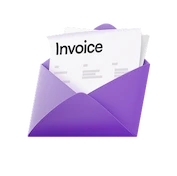Un compte fiable ouverture de compte très facile je recommande est vraiment au top
Le compte pro malin
Ouvrez votre compte en pro en quelques minutes, au meilleur prix. Gagnez jusqu’à 10% de cashback et faites fructifier votre trésorerie grâce au Compte Intérêts. IBAN français.
Trustpilot : Excellent ! | Plus de 25 000 avis
L'excellence Vivid
Nos récentes réussites et distinctions

Meilleur compte pro 2025
Detective-banque.fr

N°1 banque en ligne pour les pros
Lespionnieres.org

Avis sur Vivid : Très bon
Lecomparatifdesbanques
.com
"Très bon niveau de services"
Finance-heros.fr
La solution tout-en-un pour les entreprises et les indépendants
«Vivid veut démocratiser le placement de trésorerie avec son Compte Intérêts» — MoneyVox
Faites fructifier votre trésorerie
Placez votre trésorerie et profitez d’un taux d’intérêt fixe de 4 % par an* pendant les 4 premiers mois, puis d’un taux allant jusqu’à 2 % par an *, selon votre plan. Touchez vos intérêts chaque jour. Votre argent est placé dans des fonds monétaires notés AAA/Aaa. En savoir plus.

Plus de 500 000 clients à travers l'Europe
Des avis authentiques montrent pourquoi tant d’entreprises et de particuliers choisissent Vivid.
4,6
Évaluation Trustpilot
Noté « Excellent » – 4,6/5 sur plus de 25 000 avis.
4,5
App Store & Google Play
4,5/5 sur 51 000+ avis pour l’application mobile « Vivid Business & Personal »
24h/24 7j/7
Service client
Une équipe à votre écoute, jour et nuit.
Le compte pro qui inspire confiance
Des plans adaptés à chaque entreprise
Idéal pour les entreprises en croissance avec contrôle avancé
- Commencer
Free Start
Parfait pour les jeunes sociétés qui veulent se lancer à moindre frais
0 € / mois
Toujours gratuit- Comptes
- Comptes gratuits avec IBAN françaisIllimité
- Rémunération de la tréso, taux d’intérêt annuel fixe initial4%
- Rémunération de la tréso, taux annuel fixe après 4 mois de promotion0,1%
- Cartes et Cashback
- Cashback illimité garanti0,1%
- Cashback sur une sélection de catégories et de marques, jusqu’à2%
- Cartes virtuelles et physiquesGratuit
- Plafond de dépenses par carte étendu (services publicitaires et informatiques)Illimité
- Virements
- SEPA instantanéGratuit
- SWIFT entrantGratuit
- SWIFT sortants5 €
- Service client
- Disponible 24h/24 et 7j/7Oui
- Comptes
- Commencer
Basic
Adapté aux entreprises qui cherchent le meilleur rapport qualité prix pour leur banque du quotidien
6,9 € / moisHT
2 mois d’essai gratuit- Comptes
- Comptes gratuits avec IBAN françaisIllimité
- Rémunération de la tréso, taux d’intérêt annuel fixe initial4%
- Rémunération de la tréso, taux annuel fixe après 4 mois de promotion0,5%
- Cartes et Cashback
- Cashback illimité garanti0,2%
- Cashback sur une sélection de catégories et de marques, jusqu’à4%
- Cartes virtuelles et physiquesGratuit
- Plafond de dépenses par carte étendu (services publicitaires et informatiques)Illimité
- Virements
- SEPA instantanéGratuit
- SWIFT entrantGratuit
- SWIFT sortants5 gratuits par mois, puis 5 €
- Service client
- Disponible 24h/24 et 7j/7Oui
- Comptes
- Commencer
Pro
Idéal pour les entreprises en croissance avec contrôle avancé
18,9 € / moisHT
2 mois d’essai gratuit- Comptes
- Comptes gratuits avec IBAN françaisIllimité
- Rémunération de la tréso, taux d’intérêt annuel fixe initial4%
- Rémunération de la tréso, taux annuel fixe après 4 mois de promotion1,3%
- Cartes et Cashback
- Cashback illimité garanti0,5%
- Cashback sur une sélection de catégories et de marques, jusqu’à6%
- Cartes virtuelles et physiquesGratuit
- Plafond de dépenses par carte étendu (services publicitaires et informatiques)Illimité
- Virements
- SEPA instantanéGratuit
- SWIFT entrantGratuit
- SWIFT sortants10 gratuits par mois, puis 5 €
- Service client
- Disponible 24h/24 et 7j/7Oui
- Comptes
- Facturation clientsGratuit
- Documents à joindre pour la comptabilité (Limité à 25 dans les plans gratuits)Illimité
- Intégrations (Agicap, Sage, EBP et bien d’autres)Gratuit
- Voyages pros : cashback jusqu'à30%
- Récompenses Gains Crypto jusqu’à8% APY
- Frais sur les paiements par carte des clients (cartes EEE). À partir de0,79% (+0,25 €)
- Compte-titres (actions, ETFs, crypto)Gratuit
- Employés digitaux (assistants IA personnel et juridique)Gratuit
Comptes personnels pour cadres et membres d’équipe
Gardez une vue d'ensemble claire de vos finances sur une seule plateforme. Profitez pleinement de vos fonds professionnels et privés grâce à des intérêts élevés sur les fonds non investis, du cashback pour chaque achat par carte et une large gamme d'options d'investissement en actions, ETF et cryptomonnaies.

Votre argent est en sécurité chez nous

Stocké en toute sécurité
Votre argent est investi dans des actifs tels que des dépôts auprès de la Banque Centrale du Luxembourg et des Fonds du Marché Monétaire éligibles de haute qualité (QMMF) gérés par BlackRock et d’autres. Contrairement aux banques traditionnelles, nous n’utilisons pas les fonds de nos client(e)s pour accorder des prêts à risque.
Supervisés par les autorités financières européennes
Tous nos services sont assurés par le groupe Vivid Money : Vivid Money SA est réglementée par la Commission de Surveillance du Secteur Financier (CSSF) du Luxembourg et Vivid Money B.V. est régulée par l’Autorité Néerlandaise pour les Marchés Financiers (AFM).
Garantie contre notre insolvabilité
Vos fonds sont conservés séparément des nôtres. Dans le cas improbable où Vivid Money SA ou Vivid Money B.V. deviendrait insolvable, les fonds de nos clients restent en sécurité, même au-delà de 100 000 €. Les fonds déposés sur votre compte vous appartiennent, et à vous seul.

Sécurité de paiement de haut niveau
Nous appliquons les normes de sécurité des données de l'industrie des cartes de paiement pour protéger vos données de paiement.

Double authentification
Nous utilisons l'authentification en deux étapes pour chaque achat en ligne, ce qui garantit qu'aucun paiement n'est traité sans votre autorisation.

Conformité au RGPD
Nos serveurs se trouvent dans l'Union européenne, ce qui garantit une conformité totale avec les réglementations RGPD.











